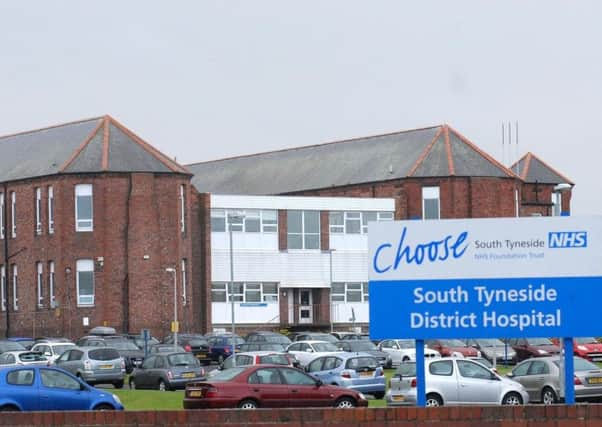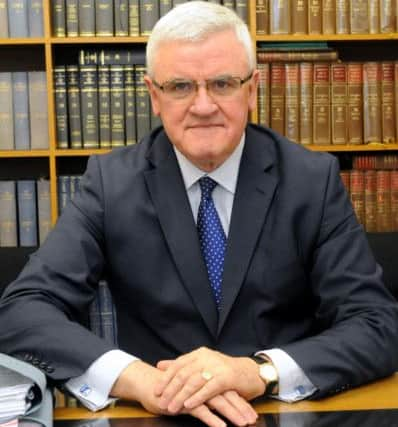Elderly man died after breaking his neck in a tragic fall down the stairs


Ronald McCluskey died following complications linked to a tragic fall in his home.
Mr McCluskey developed bronchial pneumonia after he was admitted to South Tyneside District Hospital following the fall in which he broke his neck.


Advertisement
Hide AdAdvertisement
Hide AdThe 82-year-old, who had dementia, was at his home in Cedar Grove, Whitburn, when he suffered the fall on February 11 last year.
South Tyneside coroner Terence Carney, holding an inquest into his death, heard that he died days later at the hospital in Harton Lane, South Shields.
The cause of death was given as bronchial pneumonia due to a period of immobility due to the fracture of the neck, contributed to by dementia and diabetes.
Mr McCluskey was at home with his live-in carer, Elaine Richardson when he fell. She explained he had been feeling poorly.


Advertisement
Hide AdAdvertisement
Hide AdShe said: “He was in front of me and was holding onto the banister on either side. He got about nine steps up and for whatever reason he took his hands off the banister and fell back.
“I tried to hold onto him but although he was quite small he was quite stocky and he knocked me down the stairs and I saw him hit the floor.
“He landed on his head then the rest of his body fell down.”
Ms Richardson said she heard a cracking noise as he fell and quickly called 999.
Advertisement
Hide AdAdvertisement
Hide AdParamedics arrived and she followed her patient to the hospital with his sister-in-law Mary Hand and friend Harry Smithson.
The carer said when she arrived at the hospital with the others, they told staff they were there to see Mr McCluskey and were shown to his room. Concerns were raised that staff never asked them who they were or what their relationship to Mr McCluskey was.
Mr Carney read out an email from Mr McCluskey’s daughter, Deborah Carey, who outlined issues around her father’s hospital care.
The inquest heard that an X-ray did not reveal any fractures, and that hospital staff removed Mr McCluskey’s neck brace and told Ms Richardson she could take him home.
Advertisement
Hide AdAdvertisement
Hide AdHowever, the party expressed concern for taking him home in their car when he had suffered a head injury and doctors decided he should be admitted.
A CT scan later revealed his fractured neck and his neck brace was re-applied.
Mrs Carey was also concerned that no next of kin information was requested.
She also wanted to know when the first neck collar was removed, and when the second one was put on.
Advertisement
Hide AdAdvertisement
Hide AdMr Carney was told that Mr McCluskey, who was also dad to Army medic Colonel Ali McCluskey, had to be sedated due to his dementia, as he kept trying to remove his collar and could not stay still.
Doctors also said they decided not to operate because of the risks, and instead moved Mr McCluskey to a ward to make him as comfortable as possible.
Dr Kishor Roy, the consultant on call in A&E the night Mr McCluskey was admitted, said he had ordered a CT scan despite the X-ray not showing any breaks.
When asked why he removed the neck collar in the first place, he said: “There was evidence from a consultant radiologist that there was no fracture. The patient was agitated and we don’t always use a collar because at times they can cause more issues if a patient is fidgeting and trying to remove it.”
Advertisement
Hide AdAdvertisement
Hide AdMr Carney said while he understood the family’s concerns, he did not feel the issues directly contributed to Mr McCluskey’s death.
He said: “But there are matters which could and should be dealt with appropriately.”
He said he did not intend to use his coronial powers to make formal suggestions to the hospital trust, but that he would write to them informally, suggesting they look at the issues raised by the family.
He added: “I will write to the Trust but not in a formal way, but as a matter of courtesy, I expect them to respond.”
Advertisement
Hide AdAdvertisement
Hide AdHe ruled that Mr McCluskey’s death came about because of “a fall with such tragic results”.
South Tyneside NHS Foundation Trust’s medical director, Dr Shaz Wahid, said: “We would like to extend our deepest sympathies to Mr McCluskey’s family on their sad loss. We are sorry that they have concerns about their experience at South Tyneside District Hospital but we are satisfied, and the Coroner Mr Carney agreed, that Mr McCluskey received the correct treatment.
“Ensuring the overall experience for patients and their families and carers is of the highest quality is always a top priority and we will, of course, thoroughly investigate any issues raised by the Coroner in his letter to the Trust and, where necessary, ensure that lessons are learned for the future.”
Finding: Accidental death